Abstract
1. The heart of several species including man contains atypical beta-adrenoceptors, in addition to coexisting beta 1- and beta 2-adrenoceptors. We now asked the question whether or not the third cardiac beta-adrenoceptor is identical to the putative beta 3-adrenoceptor. We compared the properties of the third cardiac beta-adrenoceptor with those of beta 3-adrenoceptors in isolated tissues of the rat. To study the third cardiac beta-adrenoceptor we used spontaneously beating right atria, paced left atria and paced left ventricular papillary muscles. As a likely model for putative beta 3-adrenoceptors we studied atypical beta-adrenoceptors of the colonic longitudinal muscle precontracted with 30 mM KCl. We used beta 3-adrenoceptor-selective agonists, antagonists and non-conventional partial agonists (ie high-affinity blockers of both beta 1- and beta 2-adrenoceptors know to exert also stimulant effects through beta 3-adrenoceptors). 2. The non-conventional partial agonist (-)-CGP 12177 caused positive chronotropic effects in right atria (pD2 = 7.3) and positive inotropic effects in left atria (pD2 = 7.5). The stimulant effects of (-)-CGP 12177 were resistant to blockade by 200 nM-2 microM (-)-propranolol and 3 microM ICI 118551 (a beta 2-selective antagonist) but antagonized by 1 microM (-)-bupranolol (pKB = 6.4-6.8), 3 microM CGP 20712A (a beta 1-selective antagonist) (pKB = 6.3-6.4) and 6.6 microM SR 59230A (a beta 3-selective antagonist, pKB = 5.1-5.4). 3. The non-conventional partial agonist cyanopindolol caused positive chronotropic effects in right atria (pD2 = 7.7) and positive inotropic effects in left atria (pD2 = 7.1). The stimulant effects of cyanopindolol were resistant to blockade by 200 nM (-)-propranolol but antagonized by 1 microM (-)-bupranolol (pKB = 6.8-7.1). 4. Neither (-)-CGP 12177 nor cyanopindolol caused stimulant effects in papillary muscles at concentrations between 0.2 nM and 20 microM. 5. In the presence of 200 nM (-)-propranolol the beta 3-adrenoceptor-selective agonists BRL 37344 (6 microM), SR 58611A (6 microM), ZD 2079 (60 microM) and CL 316243 (60 microM) did not cause stimulant effects or modify the potency and efficacy of the effects of (-)-CGP 12177 in right and left atria. The combination of 2 microM (-)-propranolol and 2 microM (-)-noradrenaline did not modify the chronotropic potency and efficacy of (-)-CGP 12177 compared to the potency and efficacy in the presence of 2 microM (-)-propranolol alone. 6. (-)-CGP 12177 relaxed the colon with a pD2 of 6.9 and a maximum effect of 55% compared to (-)-isoprenaline. The relaxant effects of (-)-CGP 12177 were resistant to blockade by 200 nM (-)-propranolol, 3 microM CGP 20712A, 3 microM ICI 118551 but blocked by 2 microM (-)-propranolol (pKB = 6.0), 1 microM (-)-bupranolol (pKB = 6.4) and 3 microM SR 59230A (pKB = 6.3). In the presence of 200 nM (-)-propranolol, (-)-CGP 12177 (20 microM) antagonized surmountably the relaxant effects of BRL 37344 (pKP = 7.3) (-)-noradrenaline (pKP = 7.0); and CL 316243 (pKP = 7.0). 7. Cyanopindolol in the presence of 200 nM (-)-propranolol relaxed the colon with a pD2 of 7.0 and a maximum effect of 40% compared to (-)-isoprenaline. As expected from a partial agonist, cyanopindolol antagonized the relaxant effects of both BRL 37344 and CL 316243 with a pKP = 7.6 and (-)-noradrenaline with a pKP = 7.4. 8. The following beta 3-adrenoceptor-selective agonists were potent colonic relaxants (pD2 values between parentheses): BRL 37344 (9.1), ZD 2079 (7.0), CL 316243 (9.0) and SR 58611A (8.2). The relaxant effects of these agonists were only marginally affected by 200 nM (-)-propranolol, not blocked by 3 microM CGP 20712A or 3 microM ICI 118551, and blocked by SR 59230A 3 microM (pKB = 6.9-7.5), 1 microM (-)-bupranolol (pKB = 6.2-6.4) and 2 microM (-)-propranolol (pKB = 6.3-6.5). 9...
Full text
PDF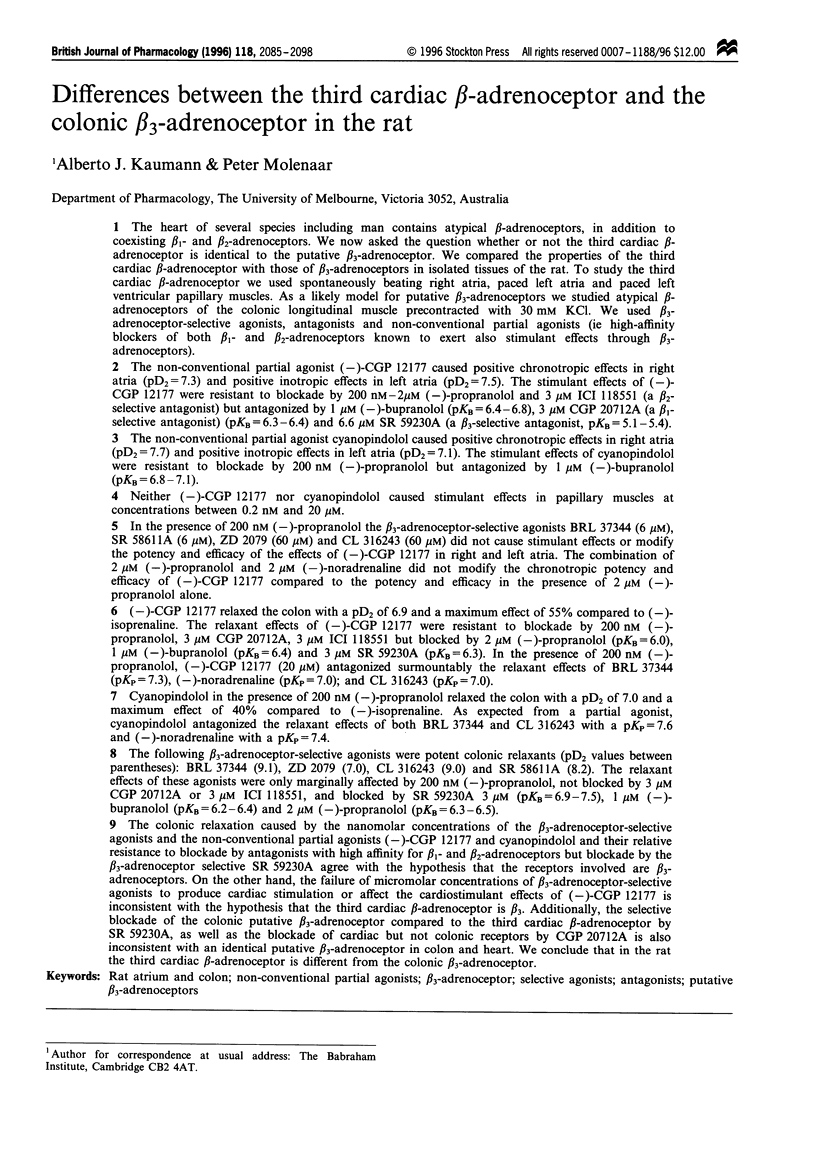
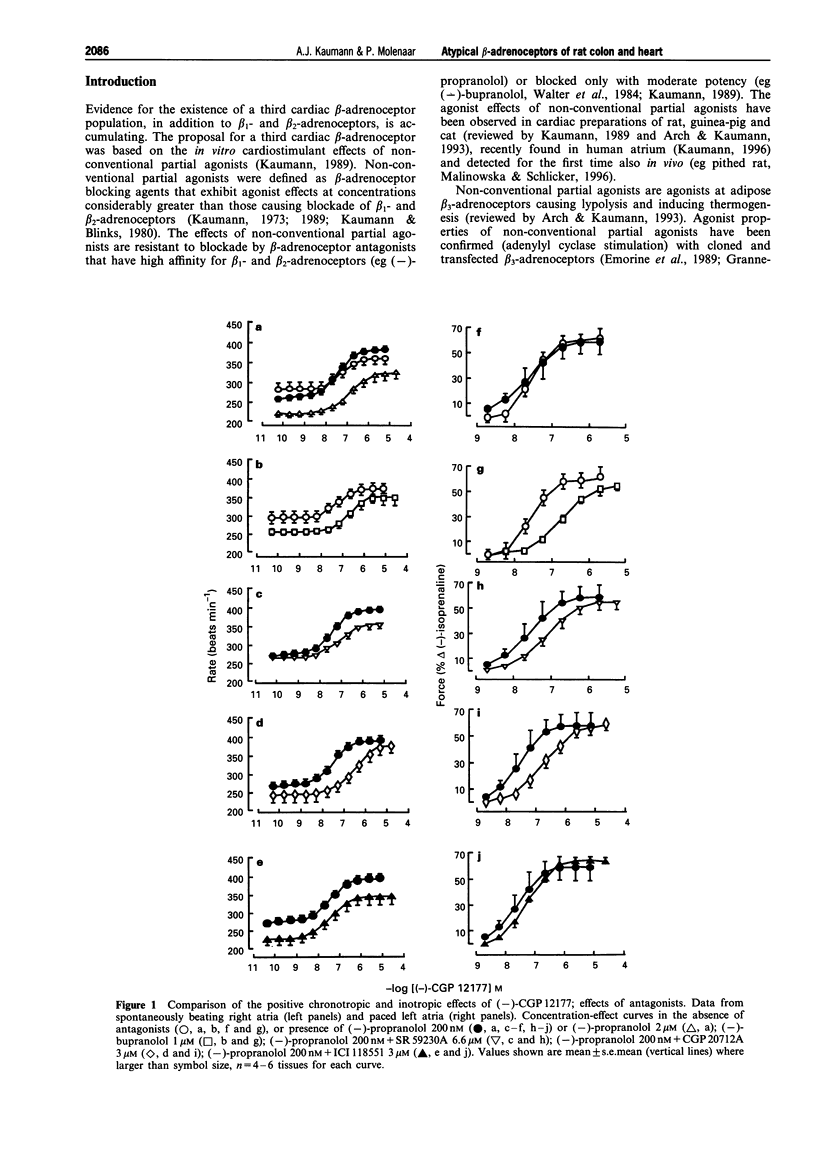
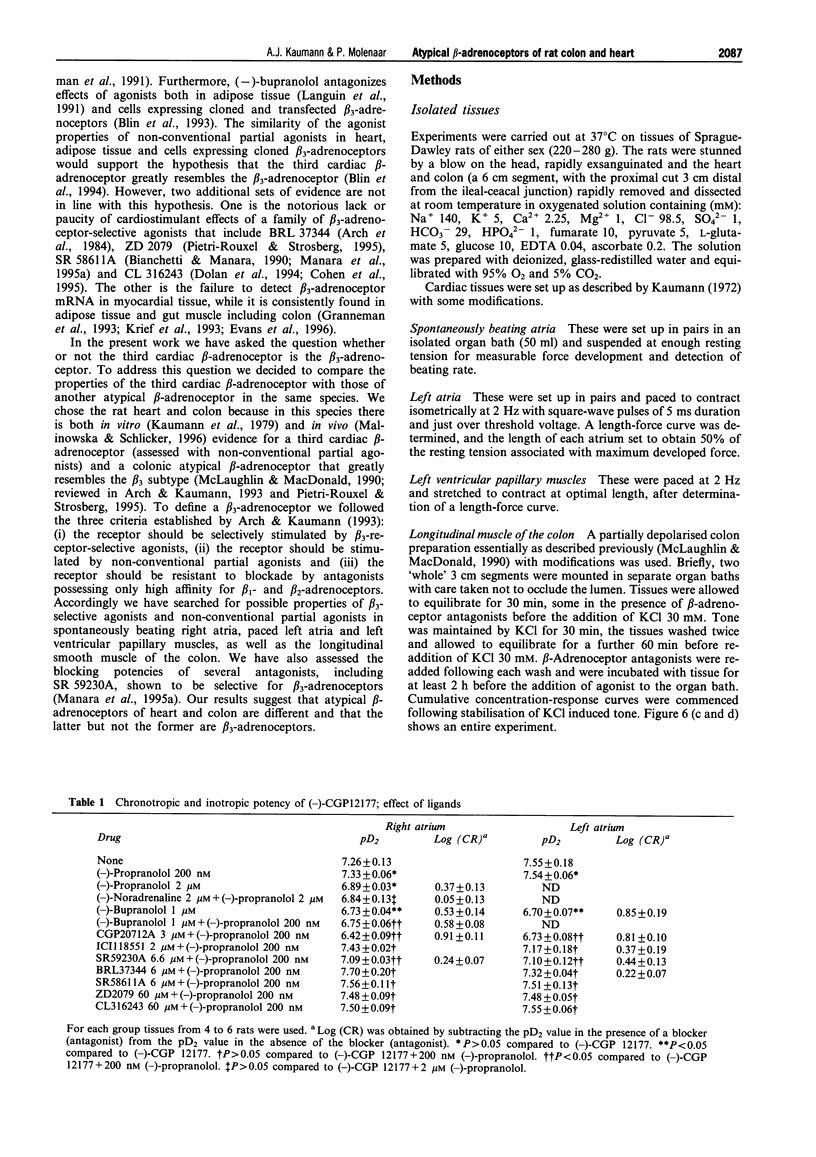
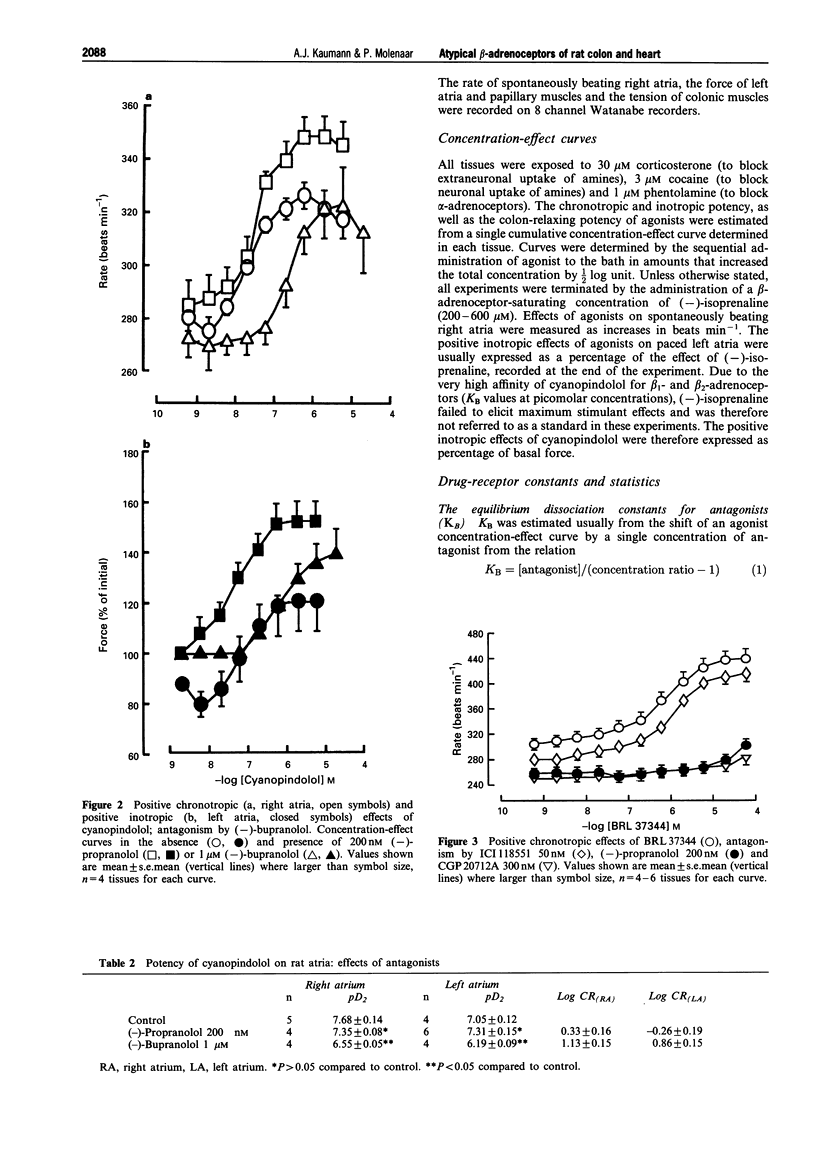
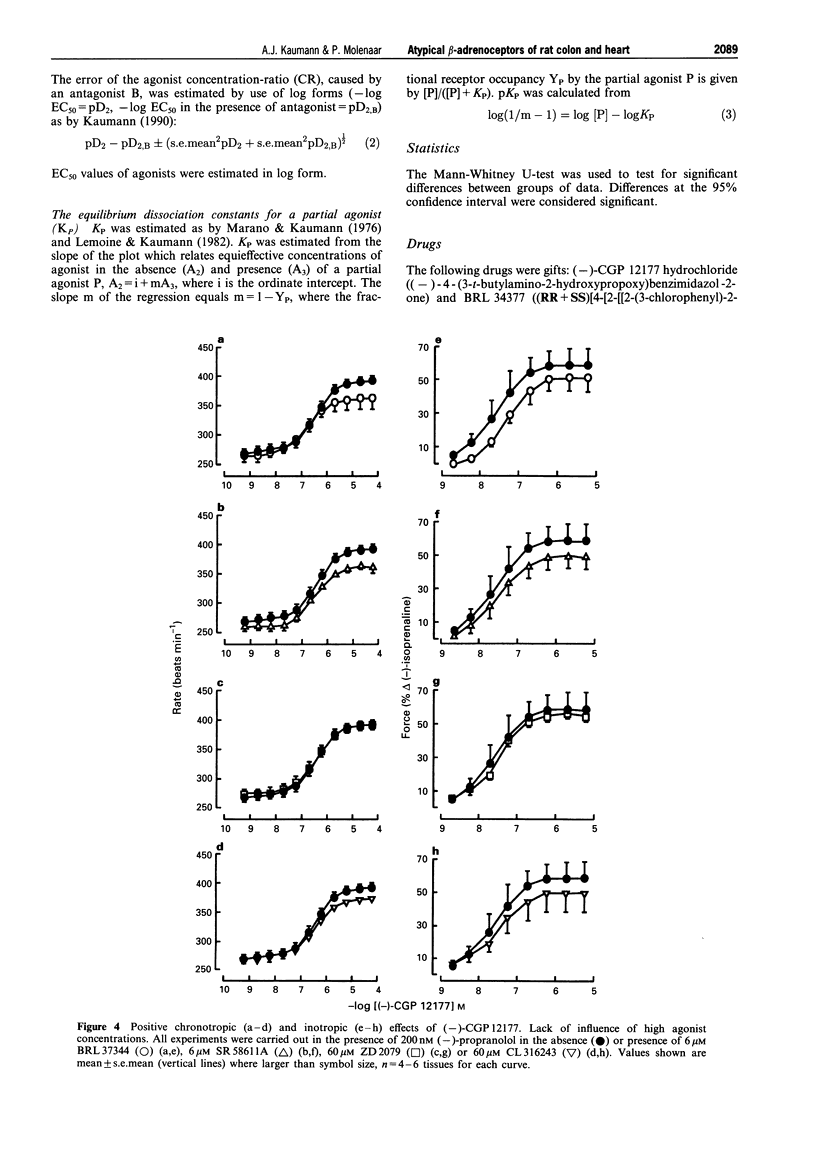
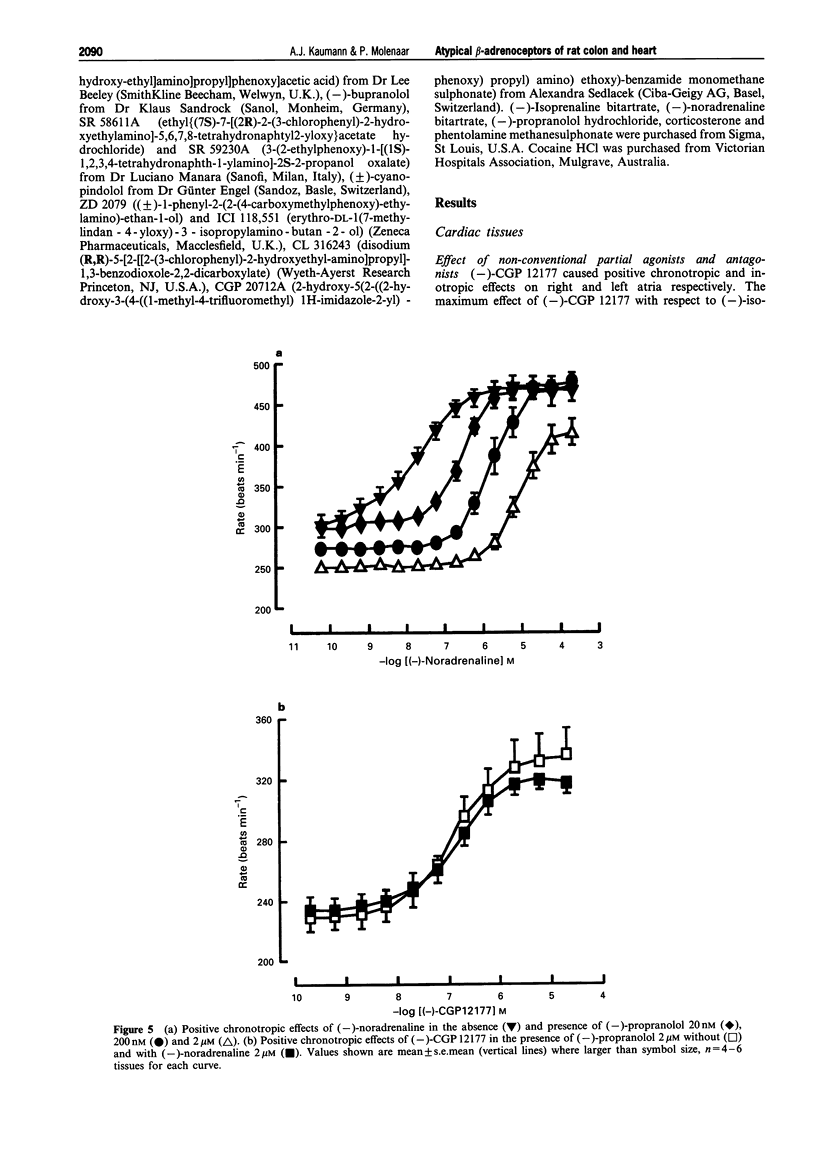
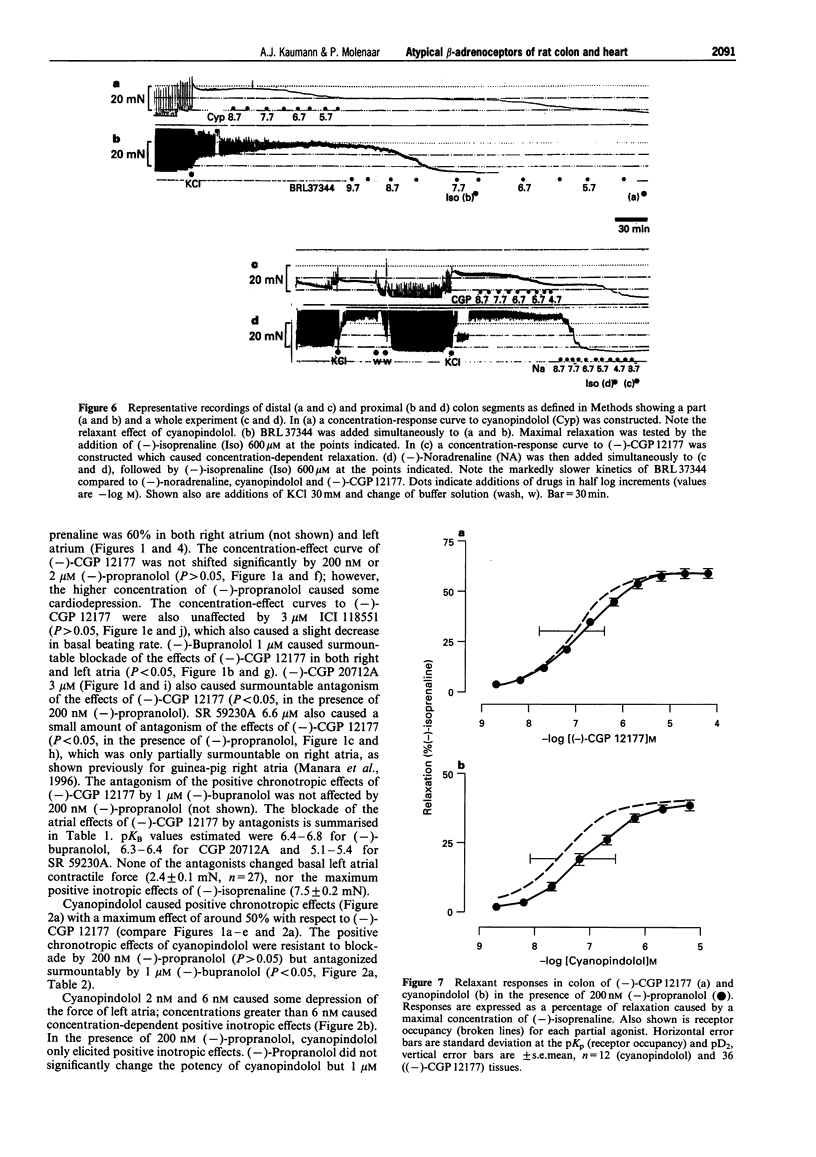
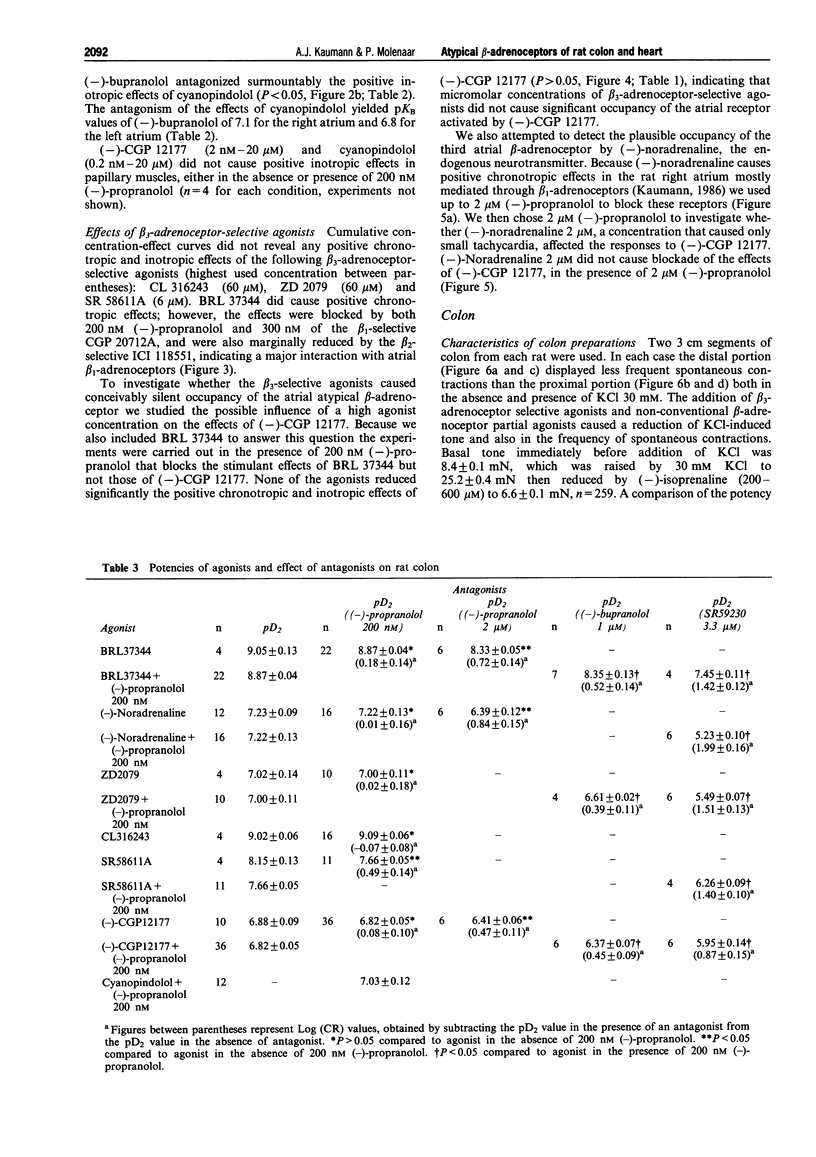
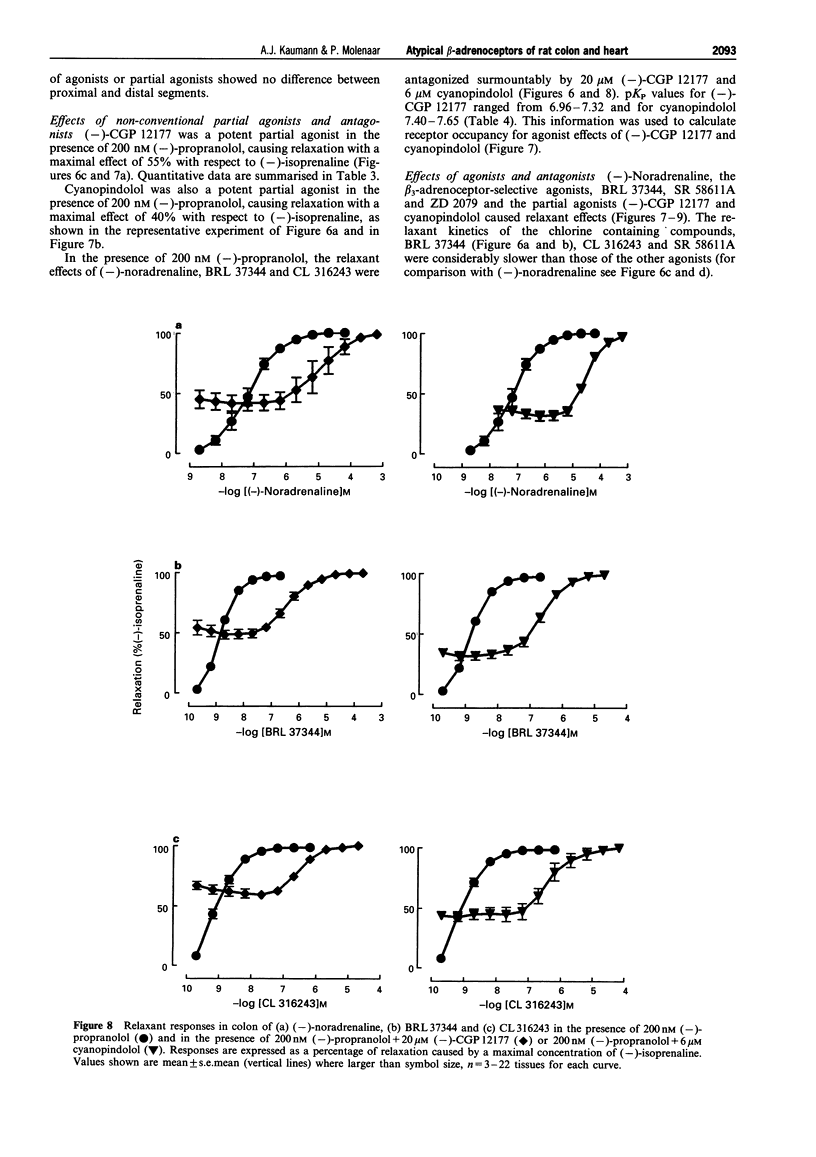
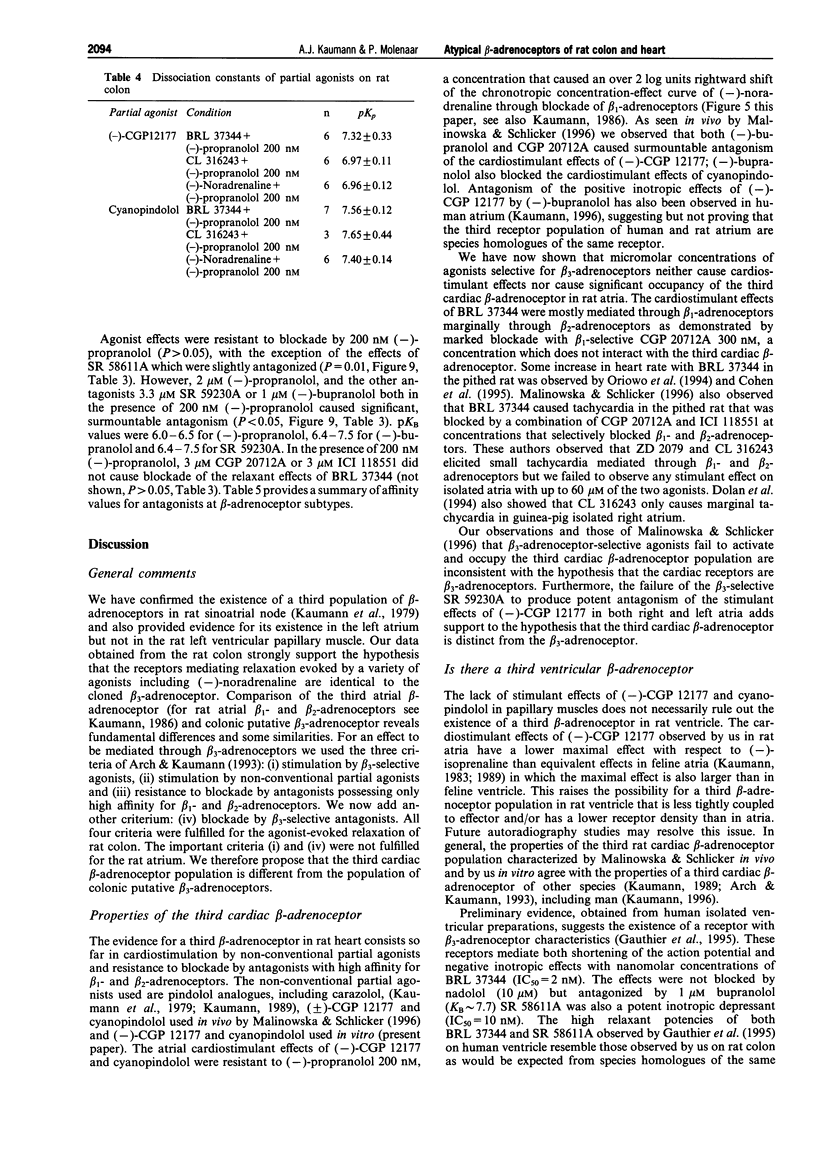
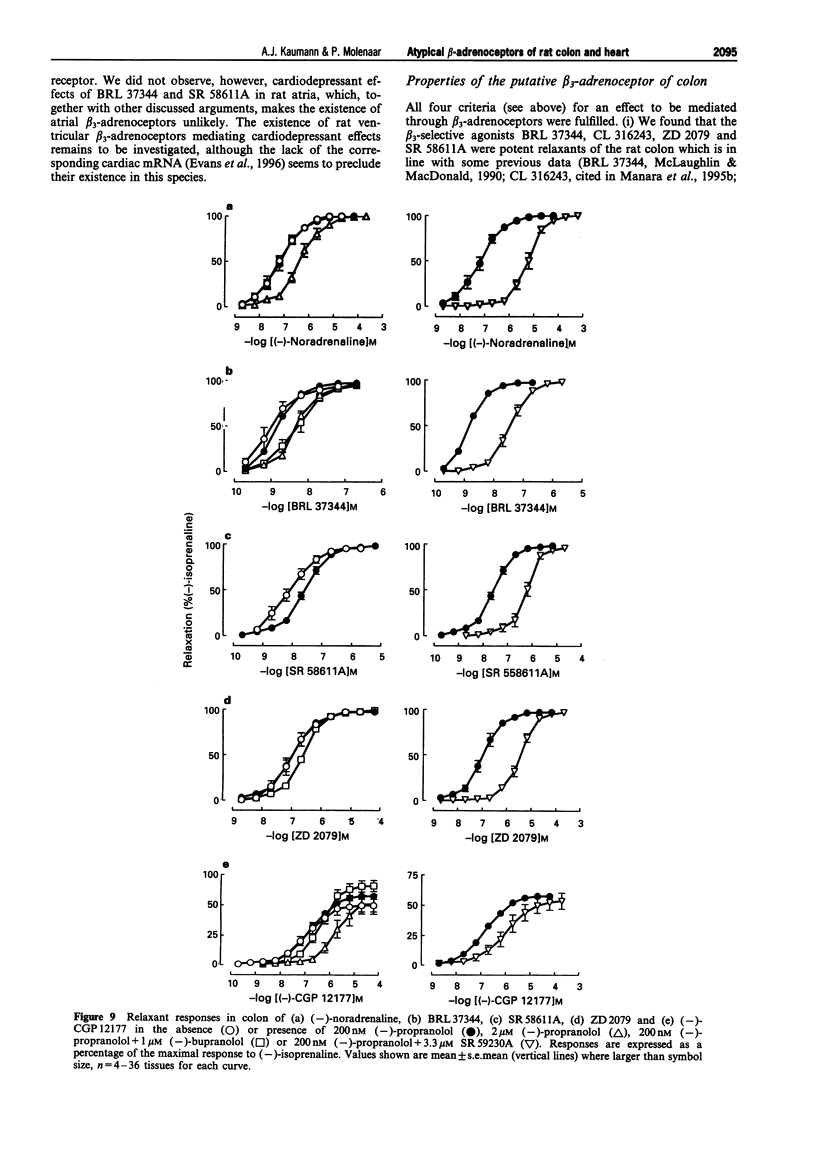
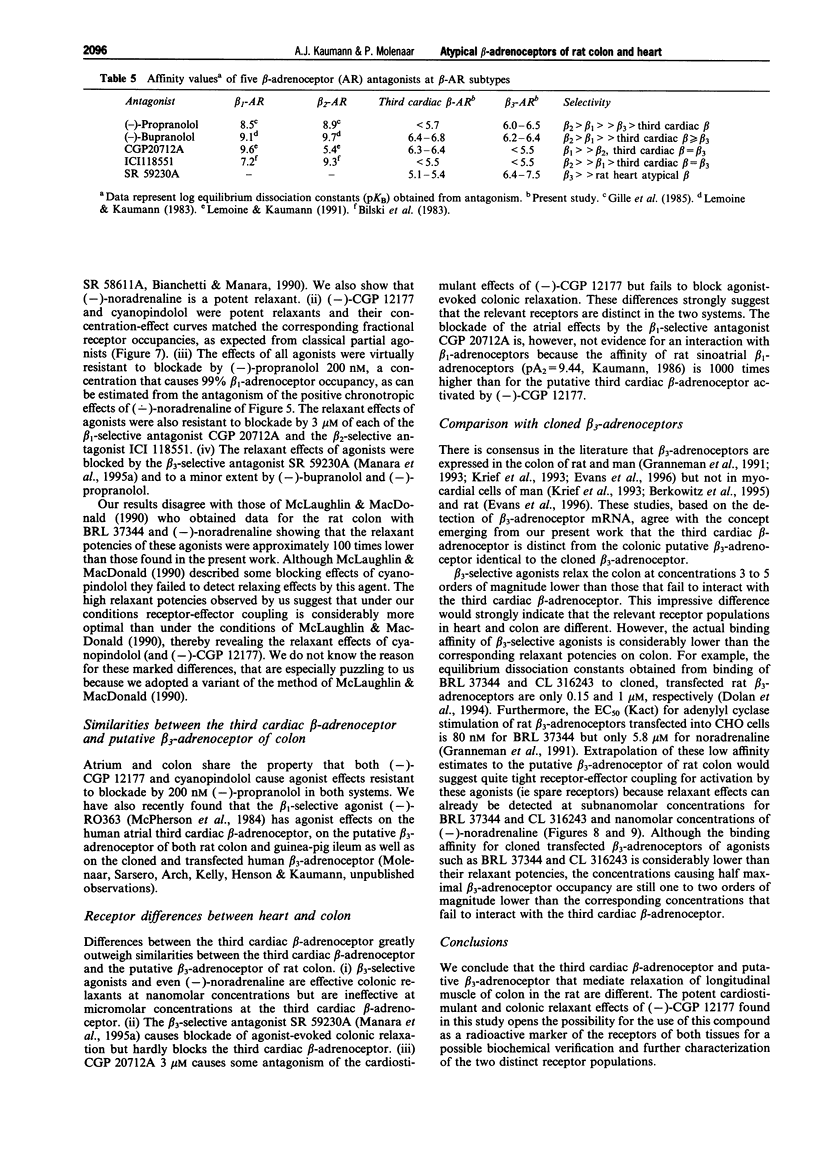
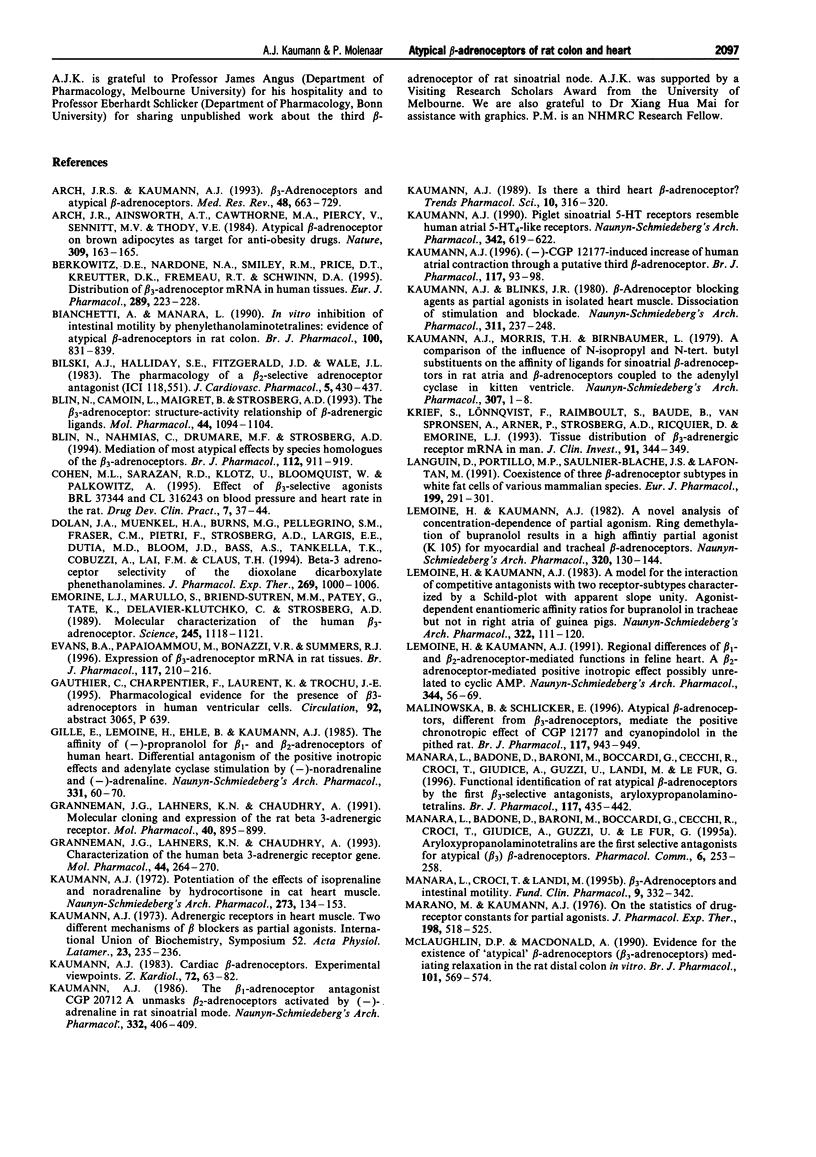
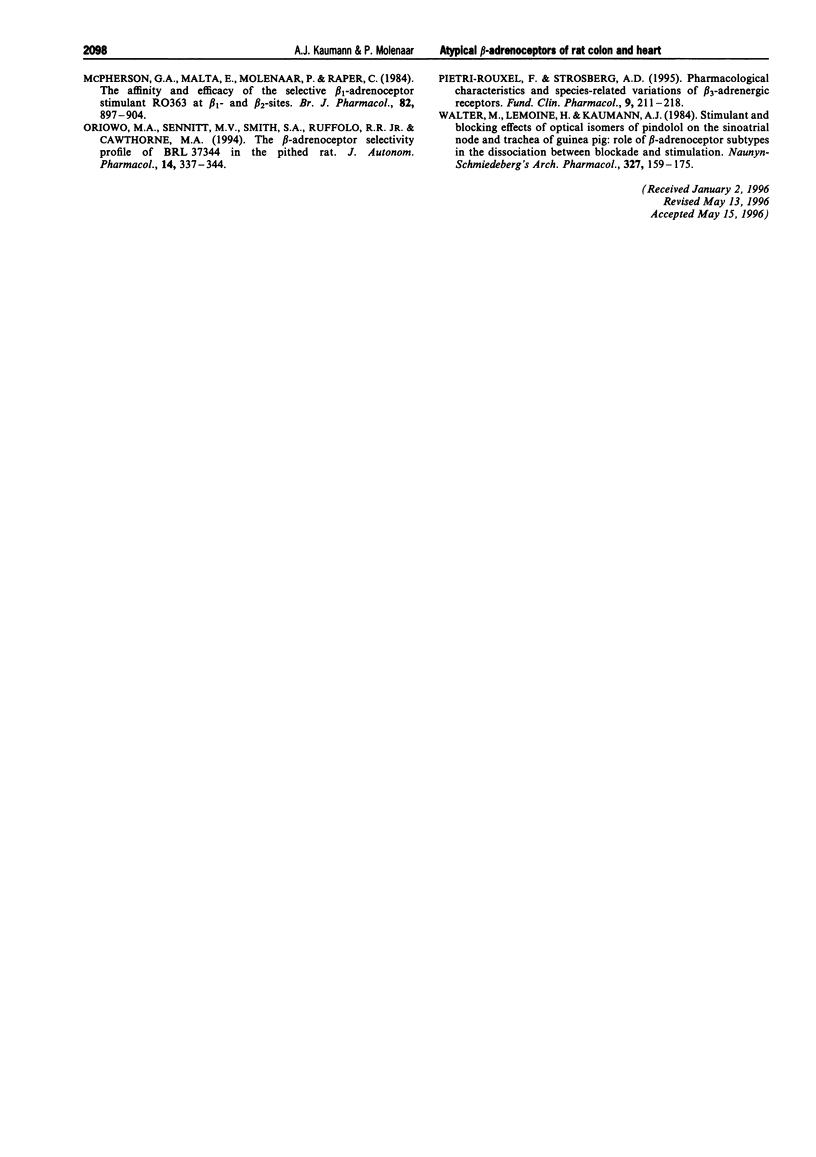
Selected References
These references are in PubMed. This may not be the complete list of references from this article.
- Arch J. R., Ainsworth A. T., Cawthorne M. A., Piercy V., Sennitt M. V., Thody V. E., Wilson C., Wilson S. Atypical beta-adrenoceptor on brown adipocytes as target for anti-obesity drugs. Nature. 1984 May 10;309(5964):163–165. doi: 10.1038/309163a0. [DOI] [PubMed] [Google Scholar]
- Arch J. R., Kaumann A. J. Beta 3 and atypical beta-adrenoceptors. Med Res Rev. 1993 Nov;13(6):663–729. doi: 10.1002/med.2610130604. [DOI] [PubMed] [Google Scholar]
- Berkowitz D. E., Nardone N. A., Smiley R. M., Price D. T., Kreutter D. K., Fremeau R. T., Schwinn D. A. Distribution of beta 3-adrenoceptor mRNA in human tissues. Eur J Pharmacol. 1995 Apr 28;289(2):223–228. doi: 10.1016/0922-4106(95)90098-5. [DOI] [PubMed] [Google Scholar]
- Bianchetti A., Manara L. In vitro inhibition of intestinal motility by phenylethanolaminotetralines: evidence of atypical beta-adrenoceptors in rat colon. Br J Pharmacol. 1990 Aug;100(4):831–839. doi: 10.1111/j.1476-5381.1990.tb14100.x. [DOI] [PMC free article] [PubMed] [Google Scholar]
- Bilski A. J., Halliday S. E., Fitzgerald J. D., Wale J. L. The pharmacology of a beta 2-selective adrenoceptor antagonist (ICI 118,551). J Cardiovasc Pharmacol. 1983 May-Jun;5(3):430–437. doi: 10.1097/00005344-198305000-00013. [DOI] [PubMed] [Google Scholar]
- Blin N., Camoin L., Maigret B., Strosberg A. D. Structural and conformational features determining selective signal transduction in the beta 3-adrenergic receptor. Mol Pharmacol. 1993 Dec;44(6):1094–1104. [PubMed] [Google Scholar]
- Blin N., Nahmias C., Drumare M. F., Strosberg A. D. Mediation of most atypical effects by species homologues of the beta 3-adrenoceptor. Br J Pharmacol. 1994 Jul;112(3):911–919. doi: 10.1111/j.1476-5381.1994.tb13167.x. [DOI] [PMC free article] [PubMed] [Google Scholar]
- Dolan J. A., Muenkel H. A., Burns M. G., Pellegrino S. M., Fraser C. M., Pietri F., Strosberg A. D., Largis E. E., Dutia M. D., Bloom J. D. Beta-3 adrenoceptor selectivity of the dioxolane dicarboxylate phenethanolamines. J Pharmacol Exp Ther. 1994 Jun;269(3):1000–1006. [PubMed] [Google Scholar]
- Emorine L. J., Marullo S., Briend-Sutren M. M., Patey G., Tate K., Delavier-Klutchko C., Strosberg A. D. Molecular characterization of the human beta 3-adrenergic receptor. Science. 1989 Sep 8;245(4922):1118–1121. doi: 10.1126/science.2570461. [DOI] [PubMed] [Google Scholar]
- Evans B. A., Papaioannou M., Bonazzi V. R., Summers R. J. Expression of beta 3-adrenoceptor mRNA in rat tissues. Br J Pharmacol. 1996 Jan;117(1):210–216. doi: 10.1111/j.1476-5381.1996.tb15176.x. [DOI] [PMC free article] [PubMed] [Google Scholar]
- Gille E., Lemoine H., Ehle B., Kaumann A. J. The affinity of (-)-propranolol for beta 1- and beta 2-adrenoceptors of human heart. Differential antagonism of the positive inotropic effects and adenylate cyclase stimulation by (-)-noradrenaline and (-)-adrenaline. Naunyn Schmiedebergs Arch Pharmacol. 1985 Oct;331(1):60–70. doi: 10.1007/BF00498852. [DOI] [PubMed] [Google Scholar]
- Granneman J. G., Lahners K. N., Chaudhry A. Characterization of the human beta 3-adrenergic receptor gene. Mol Pharmacol. 1993 Aug;44(2):264–270. [PubMed] [Google Scholar]
- Granneman J. G., Lahners K. N., Chaudhry A. Molecular cloning and expression of the rat beta 3-adrenergic receptor. Mol Pharmacol. 1991 Dec;40(6):895–899. [PubMed] [Google Scholar]
- Kaumann A. J. (-)-CGP 12177-induced increase of human atrial contraction through a putative third beta-adrenoceptor. Br J Pharmacol. 1996 Jan;117(1):93–98. doi: 10.1111/j.1476-5381.1996.tb15159.x. [DOI] [PMC free article] [PubMed] [Google Scholar]
- Kaumann A. J., Blinks J. R. beta-Adrenoceptor blocking agents as partial agonists in isolated heart muscle: dissociation of stimulation and blockade. Naunyn Schmiedebergs Arch Pharmacol. 1980 Apr;311(3):237–248. doi: 10.1007/BF00569403. [DOI] [PubMed] [Google Scholar]
- Kaumann A. J. Herz-beta-Rezeptoren--Experimentelle Standpunkte. Z Kardiol. 1983 Feb;72(2):63–82. [PubMed] [Google Scholar]
- Kaumann A. J. Is there a third heart beta-adrenoceptor? Trends Pharmacol Sci. 1989 Aug;10(8):316–320. doi: 10.1016/0165-6147(89)90065-5. [DOI] [PubMed] [Google Scholar]
- Kaumann A. J., Morris T. H., Birnbaumer L. A comparison of the influence of N-isopropyl and N-tert butyl substituents on the affinity of ligands for sinoatrial beta-adrenoceptors in rat atria and beta-adrenoceptors coupled to the adenylyl cyclase in kitten ventricle. Naunyn Schmiedebergs Arch Pharmacol. 1979 May;307(1):1–8. doi: 10.1007/BF00506545. [DOI] [PubMed] [Google Scholar]
- Kaumann A. J. Piglet sinoatrial 5-HT receptors resemble human atrial 5-HT4-like receptors. Naunyn Schmiedebergs Arch Pharmacol. 1990 Nov;342(5):619–622. doi: 10.1007/BF00169055. [DOI] [PubMed] [Google Scholar]
- Kaumann A. J. Potentiation of the effects of isoprenaline and noradrenaline by hydrocortisone in cat heart muscle. Naunyn Schmiedebergs Arch Pharmacol. 1972;273(1):134–153. doi: 10.1007/BF00508086. [DOI] [PubMed] [Google Scholar]
- Kaumann A. J. The beta 1-adrenoceptor antagonist CGP 20712 A unmasks beta 2-adrenoceptors activated by (-)-adrenaline in rat sinoatrial node. Naunyn Schmiedebergs Arch Pharmacol. 1986 Apr;332(4):406–409. doi: 10.1007/BF00500096. [DOI] [PubMed] [Google Scholar]
- Krief S., Lönnqvist F., Raimbault S., Baude B., Van Spronsen A., Arner P., Strosberg A. D., Ricquier D., Emorine L. J. Tissue distribution of beta 3-adrenergic receptor mRNA in man. J Clin Invest. 1993 Jan;91(1):344–349. doi: 10.1172/JCI116191. [DOI] [PMC free article] [PubMed] [Google Scholar]
- Langin D., Portillo M. P., Saulnier-Blache J. S., Lafontan M. Coexistence of three beta-adrenoceptor subtypes in white fat cells of various mammalian species. Eur J Pharmacol. 1991 Jul 9;199(3):291–301. doi: 10.1016/0014-2999(91)90492-9. [DOI] [PubMed] [Google Scholar]
- Lemoine H., Kaumann A. J. A model for the interaction of competitive antagonists with two receptor-subtypes characterized by a Schild-plot with apparent slope unity. Agonist-dependent enantiomeric affinity ratios for bupranolol in tracheae but not in right atria of guinea pigs. Naunyn Schmiedebergs Arch Pharmacol. 1983 Mar;322(2):111–120. doi: 10.1007/BF00512383. [DOI] [PubMed] [Google Scholar]
- Lemoine H., Kaumann A. J. A novel analysis of concentration-dependence of partial agonism Ring-demethylation of bupranolol results in a high affinity partial agonist (K 105) for myocardial and tracheal beta-adrenoceptors. Naunyn Schmiedebergs Arch Pharmacol. 1982 Aug;320(2):130–144. doi: 10.1007/BF00506313. [DOI] [PubMed] [Google Scholar]
- Lemoine H., Kaumann A. J. Regional differences of beta 1- and beta 2-adrenoceptor-mediated functions in feline heart. A beta 2-adrenoceptor-mediated positive inotropic effect possibly unrelated to cyclic AMP. Naunyn Schmiedebergs Arch Pharmacol. 1991 Jul;344(1):56–69. doi: 10.1007/BF00167383. [DOI] [PubMed] [Google Scholar]
- Malinowska B., Schlicker E. Mediation of the positive chronotropic effect of CGP 12177 and cyanopindolol in the pithed rat by atypical beta-adrenoceptors, different from beta 3-adrenoceptors. Br J Pharmacol. 1996 Mar;117(5):943–949. doi: 10.1111/j.1476-5381.1996.tb15285.x. [DOI] [PMC free article] [PubMed] [Google Scholar]
- Manara L., Badone D., Baroni M., Boccardi G., Cecchi R., Croci T., Giudice A., Guzzi U., Landi M., Le Fur G. Functional identification of rat atypical beta-adrenoceptors by the first beta 3-selective antagonists, aryloxypropanolaminotetralins. Br J Pharmacol. 1996 Feb;117(3):435–442. doi: 10.1111/j.1476-5381.1996.tb15209.x. [DOI] [PMC free article] [PubMed] [Google Scholar]
- Manara L., Croci T., Landi M. Beta 3-adrenoceptors and intestinal motility. Fundam Clin Pharmacol. 1995;9(4):332–342. doi: 10.1111/j.1472-8206.1995.tb00507.x. [DOI] [PubMed] [Google Scholar]
- Marano M., Kaumann A. J. On the statistics of drug-receptor constants for partial agonists. J Pharmacol Exp Ther. 1976 Sep;198(3):518–525. [PubMed] [Google Scholar]
- McLaughlin D. P., MacDonald A. Evidence for the existence of 'atypical' beta-adrenoceptors (beta 3-adrenoceptors) mediating relaxation in the rat distal colon in vitro. Br J Pharmacol. 1990 Nov;101(3):569–574. doi: 10.1111/j.1476-5381.1990.tb14122.x. [DOI] [PMC free article] [PubMed] [Google Scholar]
- McPherson G. A., Malta E., Molenaar P., Raper C. The affinity and efficacy of the selective beta 1-adrenoceptor stimulant RO363 at beta 1- and beta 2-adrenoceptor sites. Br J Pharmacol. 1984 Aug;82(4):897–904. doi: 10.1111/j.1476-5381.1984.tb16488.x. [DOI] [PMC free article] [PubMed] [Google Scholar]
- Oriowo M. A., Sennitt M. V., Smith S. A., Ruffolo R. R., Jr, Cawthorne M. A. The beta-adrenoceptor selectivity profile of BRL 37344 in the pithed rat. J Auton Pharmacol. 1994 Oct;14(5):337–344. doi: 10.1111/j.1474-8673.1994.tb00614.x. [DOI] [PubMed] [Google Scholar]
- Pietri-Rouxel F., Strosberg A. D. Pharmacological characteristics and species-related variations of beta 3-adrenergic receptors. Fundam Clin Pharmacol. 1995;9(3):211–218. doi: 10.1111/j.1472-8206.1995.tb00288.x. [DOI] [PubMed] [Google Scholar]
- Walter M., Lemoine H., Kaumann A. J. Stimulant and blocking effects of optical isomers of pindolol on the sinoatrial node and trachea of guinea pig. Role of beta-adrenoceptor subtypes in the dissociation between blockade and stimulation. Naunyn Schmiedebergs Arch Pharmacol. 1984 Sep;327(2):159–175. doi: 10.1007/BF00500912. [DOI] [PubMed] [Google Scholar]


